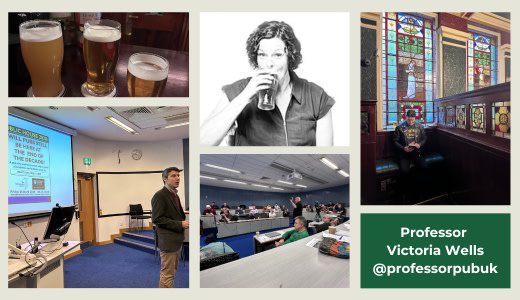
On a sunny, although still a little chilly April Friday, I found myself walking uphill towards Northumbria University. Unsurprisingly my train had been delayed and I was a little late but as soon as I arrived at the ‘Public House 2030’ event I knew my day was going to get better (the stress was quickly forgotten)!
Uniting Voices: Community and Economy
The event had been open to anyone interested in pubs and their future and it was clear on arrival that the attendees came from a diversity of different perspectives, backgrounds, and geographical regions. It was fantastic to have pub academics, like me, discussing key pub issues alongside publicans, campaigners, and people who simply love pubs. It was great to meet people I had met before and really good to be able to meet some people in person who I had only met over Twitter, Zoom, or by emails previously.
The day kicked off with a rousing welcome from organizer Prof Ignazio Cabras, and was followed by the first session which focused on pubs, the community, and the economy. Prof Ignazio Cabras discussed the positive economic impact of pubs on their local communities and on supply chains and even house prices. Dr. Thomas Thurnell-Read from Loughborough University did a fantastic presentation highlighting the social value of pubs, from lifelong friendships solidified in bars to fleeting encounters with friendly strangers. In particular, he highlighted how important pubs are in tackling loneliness and I welcomed his comment that “in an increasingly contactless society, pubs offer a distinctly in-person, analogue, social connection-based experience.” Phil Dixon, a licensed trade consultant, completed the first session discussing who owns pubs (from individuals to small breweries to pub companies) and how this affects pubs’ viability.
Personal Tales from the Heart of Pubs
Session two of the event took us from a more second-hand view to the perspective of individuals focusing on people and pubs. It was both heart warming and heart breaking to hear from publicans (both past and present) about the realities of managing a pub. Having to balance, and being motivated by the social needs of the community, alongside working 7 days a week for often low pay, coping with increasing energy (and other) prices, and at times challenging relationships with their PubCos. The clear joy of being a publican and part of a community shone through but so did the difficulties of this as a career and lifestyle choice. It was also great to hear a view from a small brewery, in this case, Sam Kellie from First & Last Brewery in Northumberland, who highlighted how important relationships are with publicans. This pre-lunch session was completed by Mark Haslam from CAMRA who highlighted issues around planning, pub closures, and community ownership (all recurring themes through the day).
Reflections Over Lunch: Networking and Nourishment
Lunch of course was a hive of chatting, people catching up with old friends and meeting new ones, and giving everyone a chance to reflect on the discussions of the morning.
Visioning the Future: Challenges and Solutions for UK Pubs
The final afternoon session was focused on “What future for UK Pubs?”. James Watson of Protect Pubs and the Campaign for Pubs kicked this session off highlighting the difficulties of pubs and planning law highlighting how many pubs had been, prior to a loophole closure, been lost to supermarkets/retail. He also highlighted examples of pub rebuilding and pop-up pubs as part of campaigns for pub reopening. Greg Mulholland, Campaign Director for the Campaign for Pubs, followed by talking about whether politicians care about pubs and talking about his time on the front line as a politician campaigning for pubs. This involved setting up the Pubs All Party Parliamentary Group (APPG). His first hand experience allowed him to reflect on and highlight that legislation can help pubs but it needs to be good legislation that has not been watered down. The event part of the day finished with a wide-ranging panel discussion which covered, amongst other topics, beer duty, planning and pubs, planning enforcement by local authorities, forthcoming elections, unfair practices, low pay, the role of pub food, minimum alcohol pricing, VAT, minimum wage, capping of small business energy rates, pub closures, duty relief, and devolution.
A Call to Action
Prof Ignazio Cabras summed up the day highlighting that “there are solutions and there is hope” for pubs. It was clear that no one in the room wanted to see pubs disappear and will fight for pubs to be open, and viable to 2030 and beyond. It was a fantastic event to be part of and I felt very lucky to have been part of it. While at some points the struggles to survive were starkly outlined everyone agreed that pubs are so important socially, and as part of our heritage, that we won’t give up these valuable spaces without a fight!
Closing Thoughts: A Hopeful Horizon for Pubs
It, of course, seemed appropriate to adjourn to the pub after a day discussing them and it was fantastic to visit both The Bacchus and the absolutely magnificent Crown Posada to continue conversations and to cement relationships. Prof Cabras hinted at the end of the event that perhaps we might return to discuss the subject again in an event in the coming years and I really hope this is the case. The day was filled with hope for pubs and it was exciting to be part of it.
Continuing Conversations: From Discussion to Action
Prof Victoria Wells is Professor of Sustainable Management and has also been called ‘Professor of Pubs’ at the University of York. She studies pub consumer behaviour and tweets at @ProfessorPubUK.